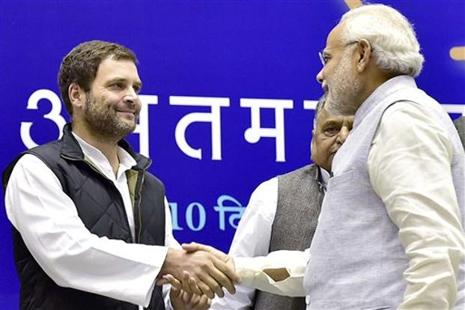India gears up for Elections 2019
January 29, 2019 | Expert Insights

The incumbent BJP and the opposition Congress have introduced lucrative incentive programs for the poor in an attempt to swing the vote in each other’s favour.
Background
The Indian National Congress is a broadly-based political party in India. Founded in 1885, it was the first modern nationalist movement to emerge in the British Empire in Asia and Africa. Congress is a secular party whose social democratic platform is generally considered to be on the centre-left of Indian politics.
Congress' social policy is based upon the Gandhian principle of Sarvodaya—the lifting up of all sections of society—which involves the improvement of the lives of economically underprivileged and socially marginalised people. The party primarily endorses social democracy—seeking to balance individual liberty and social justice, welfare and secularism—asserting the right to be free from religious rule and teachings. Its constitution states democratic socialism to be its ideal.
BJP is one of the two major political parties in India, along with the Indian National Congress. As of 2018, it is the country's largest political party in terms of representation in the national parliament and state assemblies, and it is the world's largest party in terms of primary membership. Long-time Gujarat Chief Minister Narendra Modi led it to a landslide victory in the 2014 general election. Since that election, Modi has led the NDA government as Prime Minister and as of December 2018, the alliance governs 16 states.
Analysis
Determined for the second term, the ruling Bharatiya Janata Party-led alliance will woo rural and urban middle-class voters with farm relief measures and tax cuts, said officials privy to plans for the final budget before India's general election.
Taken aback by opposition parties’ victories in three state polls last month, and need to call a national election by May, Prime Minister Narendra Modi is facing growing discontent over depressed farm incomes and doubts over whether his policies are creating enough jobs. The electoral compulsions mean that major economic reforms, such as tax cuts for bigger companies and plans to bring down the budget deficit, could be put on hold at least until after the election, the sources said.
Piyush Goyal, the interim finance minister, will present the budget on Feb. 1, in the absence of Finance Minister Arun Jaitley, who is currently in the United States for medical treatment.
The higher spending, along with a shortfall in tax collections, will push the fiscal deficit up to the equivalent of 3.5 per cent of gross domestic product for the year ending in March, overshooting a previous 3.3 per cent target, according to one of the sources with direct knowledge of budget discussions.
The leader of India’s main opposition Congress party, Rahul Gandhi, promised to provide the poor with a minimum income if Congress wins an upcoming general election, a pledge the ruling party dismissed as an unaffordable gimmick. Congress officials said the proposal would help eliminate poverty and could be fulfilled with funds now spent on food subsidies and other programmes that often do not reach the poor.
“We have decided that every poor person in India would be guaranteed a minimum income after the Congress forms the government in 2019,” Gandhi told a farmer’s rally in the central state of Chhattisgarh. “No one will go hungry in India, no one will remain poor.”
Anger over joblessness and economic hardship, especially in agricultural areas, has turned the national election due by May into a tightening race between Prime Minister Narendra Modi’s ruling Bharatiya Janata Party (BJP) and Congress. A government economic adviser, speaking on condition of anonymity, said Gandhi’s promise showed the “competitive populism” among politicians, which raises concern that whoever wins, India may breach goals to rein in its fiscal deficit.
Congress says diverting funds from India’s expensive subsidy programmes would provide enough money to eliminate poverty. India’s 2018/19 food subsidy bill alone was estimated at 1.7 trillion rupees, roughly 7 per cent of total federal spending.
Assessment
Our assessment is that it will be a significant challenge for all political parties to find the necessary resources without breaching fiscal deficit targets. Failure to cap could lead to uncontrolled inflation which would, in turn, affect the economy at large with rising prices and the fall in the parity of the rupee.








Comments